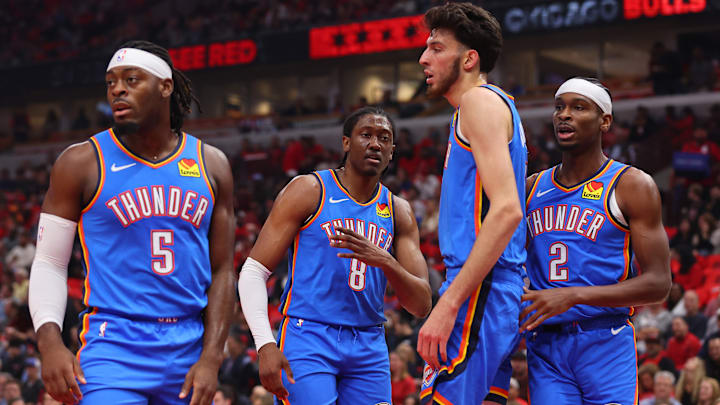Before the Denver Nuggets ran rampant through the 2023 playoffs, they were just another young team looking to take the next step. Nikola Jokic was the clear centerpiece, and Jamal Murray was his sidekick, but they needed the support of veterans to get over the hump to claim the franchise’s first NBA title.
The cycle from young up-and-coming team to playoff team to contender is a tale as old as basketball. While not every dynamic young team eventually snags a championship, an exceptional young core almost guarantees a sustained run of success. These are the ten best young cores in the NBA poised to take over the league in the coming years.
10 best young cores in NBA criteria and ranking
The criteria for a team to qualify was any team with an average age in the bottom 11, according to basketball reference. From there, teams were judged by their players in their age 25 and younger seasons and ranked based on a category system.
The ranking system is divided into four weighted categories; young star (4), multiple future stars (3), high potential (2), and depth (1). A team will receive all of the category’s allotted points if they reach the requirement, half of a category’s available points if they earn a TBD, and zero points if they are deemed to lack in that category.
The young star category is worth four points and carries the most weight because it is the most essential component to a contender. Every contender needs a great player, so already having a young player who merits that distinction puts a franchise on the fast track.
The next category, multiple future stars, can earn a team three points. To build a sustained winner, it is a necessity to have multiple All-Star caliber or better players. A player doesn’t have to be an All-Star yet to help his team qualify, but there has to be a clear trajectory based on prospect pedigree and production to warrant it.
High potential can earn a team two points and rewards teams with a collection of high-upside players. If you lack a true star or players who look on the fast track to that distinction, then the next best thing is to have players who hypothetically could reach those heights.
The final category is depth, which can earn a team one point. Everyone wants depth, but depth is essentially useless without top-end talent. Having an extensive collection of young talent allows teams to find role players without dipping into free agency or the trade market, and also are imperative to make win-now trades when a young core turns the corner.

Not so honorable mention: Washington Wizards
The Wizards are in year one of their rebuild and have next to no high-impact young talent. Bilal Coulibaly could earn that distinction by the end of the season. Still, he’s currently feasting on incredibly wide-open 3s, and his on-ball abilities are a massive question mark.
The Wizards do have a bunch of 25 and under players, but they’re mostly the Deni Avdija and Corey Kispert type of nice role-players. Jordan Poole, who was ranked 25th in Fansided’s 25-under-25, has floundered in Washington, and it’s looking very unlikely he’ll ever be anything more than sixth-man.
Best young NBA cores: 10. Portland Trail Blazers
The Trail Blazers rank 10th because they don’t have an established young star, and their two highest-upside players, Shaedon Sharpe, 20, and Scoot Henderson, 19, are so early in their development that you cannot confidently call them future stars.
Henderson was ranked 22nd in Fansided’s 25-under-25, but that ranking looks to be a bit premature. The potential is through the roof, but point guard is the most difficult position, and his jump shot is still a work in progress. He should improve throughout the season, but living up to that ranking will be difficult.
Anfernee Simons, 24, and Deandre Ayton, 25, both qualify for this exercise but are more likely than not just solid starters. Simons has missed most of the season after tearing the UCL in his thumb, but he’s an undersized guard who is a microwave of a scorer with intermittent interest in playmaking. He’s undoubtedly a good player, but he’s also not going to be one of the three best players on a contender.
Ayton’s prospect sheen looks completely gone. He’s a solid NBA center, but he plays with no force on the offensive end and isn’t good enough on defense to make up the difference. There’s still a slim chance that he realizes he’s one of the biggest and most athletic players in the league and takes a significant step, but when a player has the same problem for this long, it’s usually just who they are.
The Trail Blazers are starting their rebuild with a solid base of players and have some serious upside as well. They’ll ideally be a losing team next season, when the far stronger 2025 draft class is available, before pivoting toward mediocrity. Henderson and Sharpe’s development will determine where this rebuild goes, but there’s a good chance they rise in these rankings over the next few seasons.
